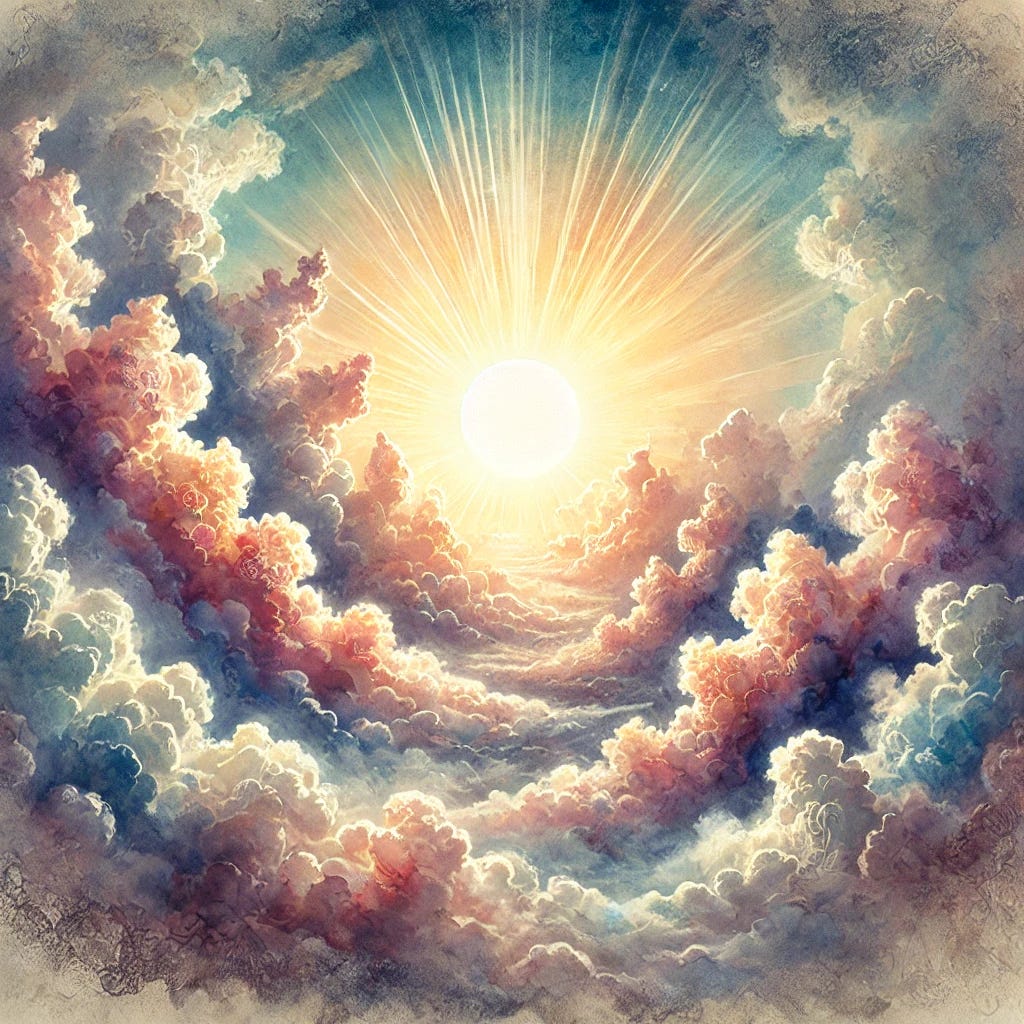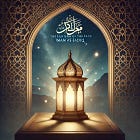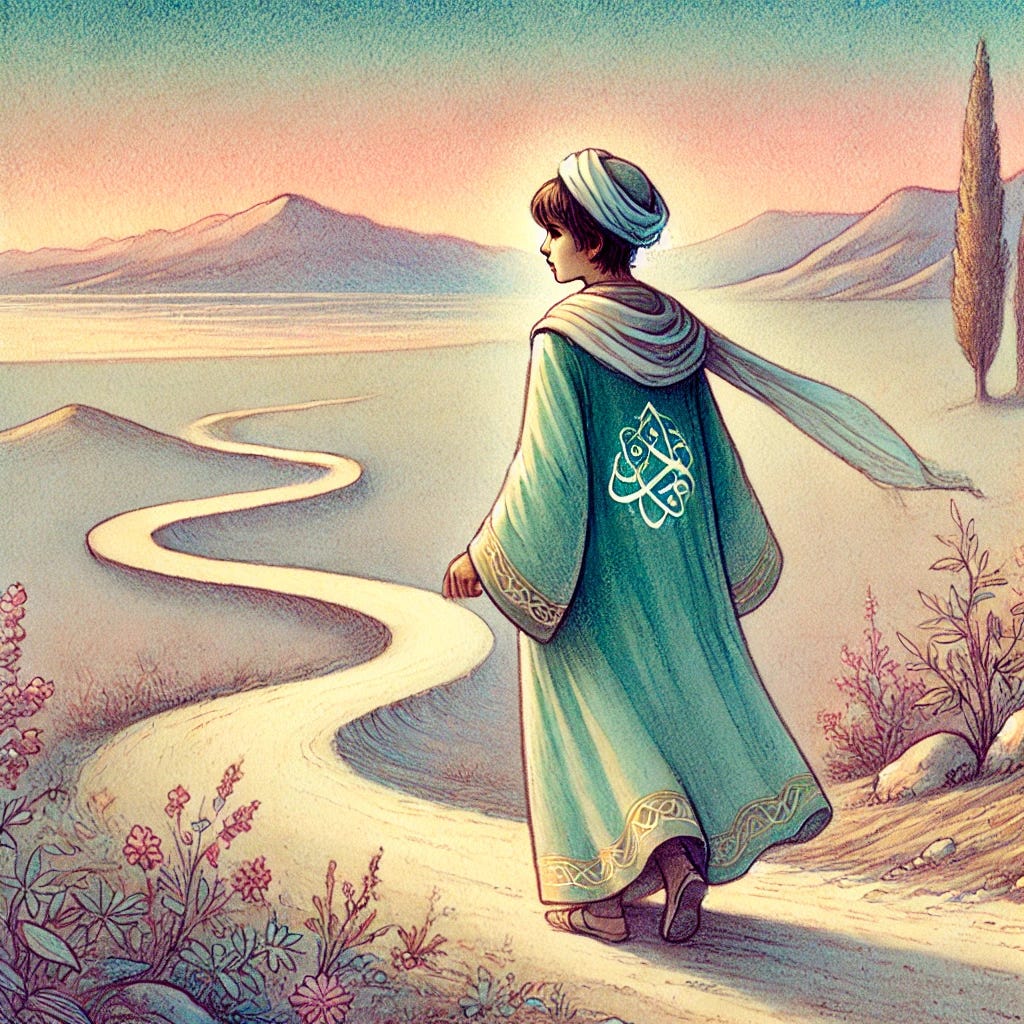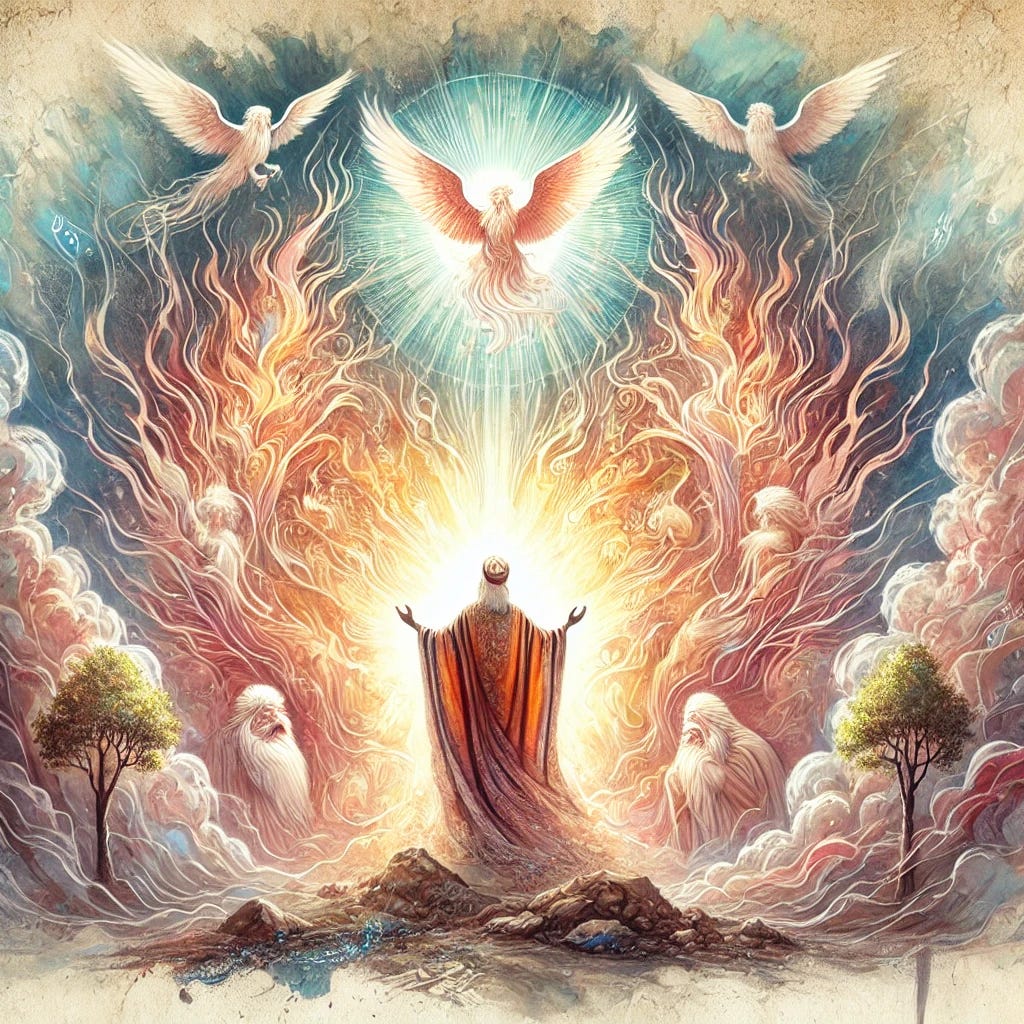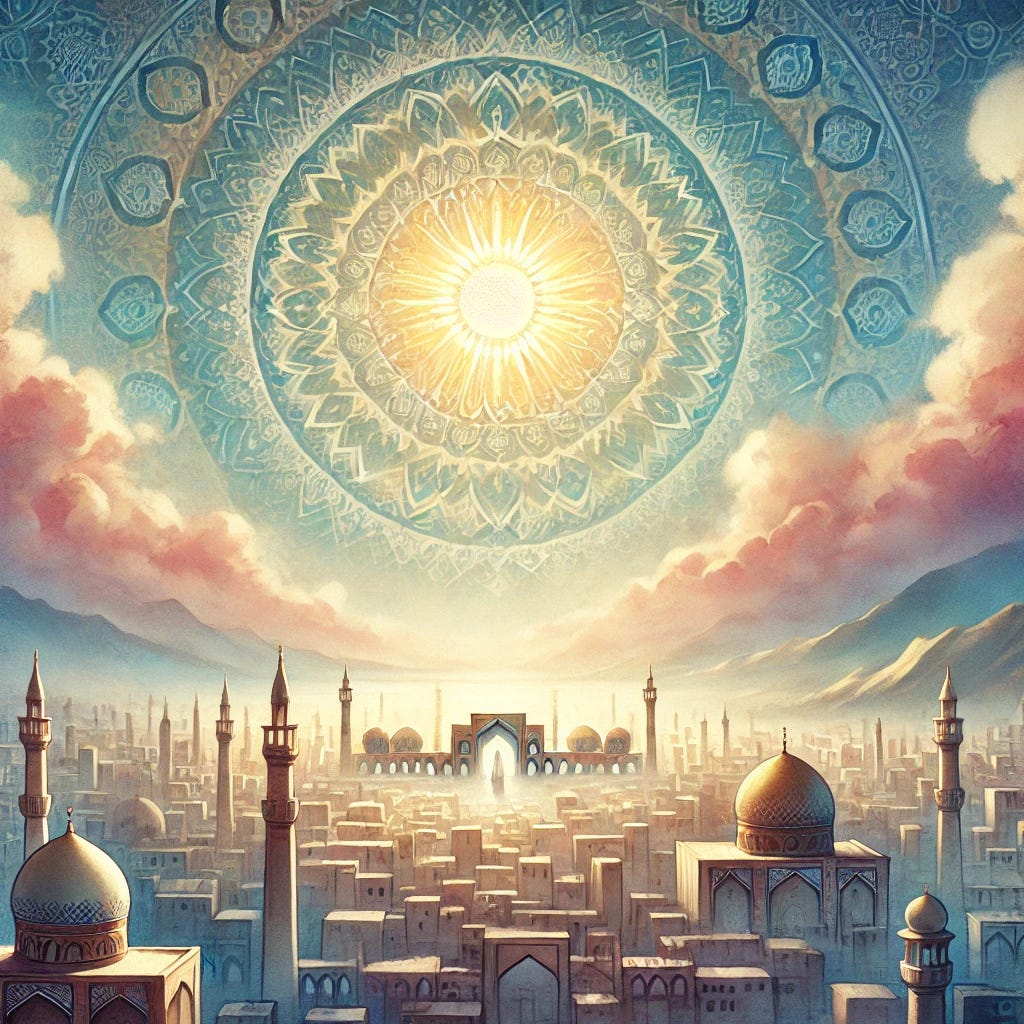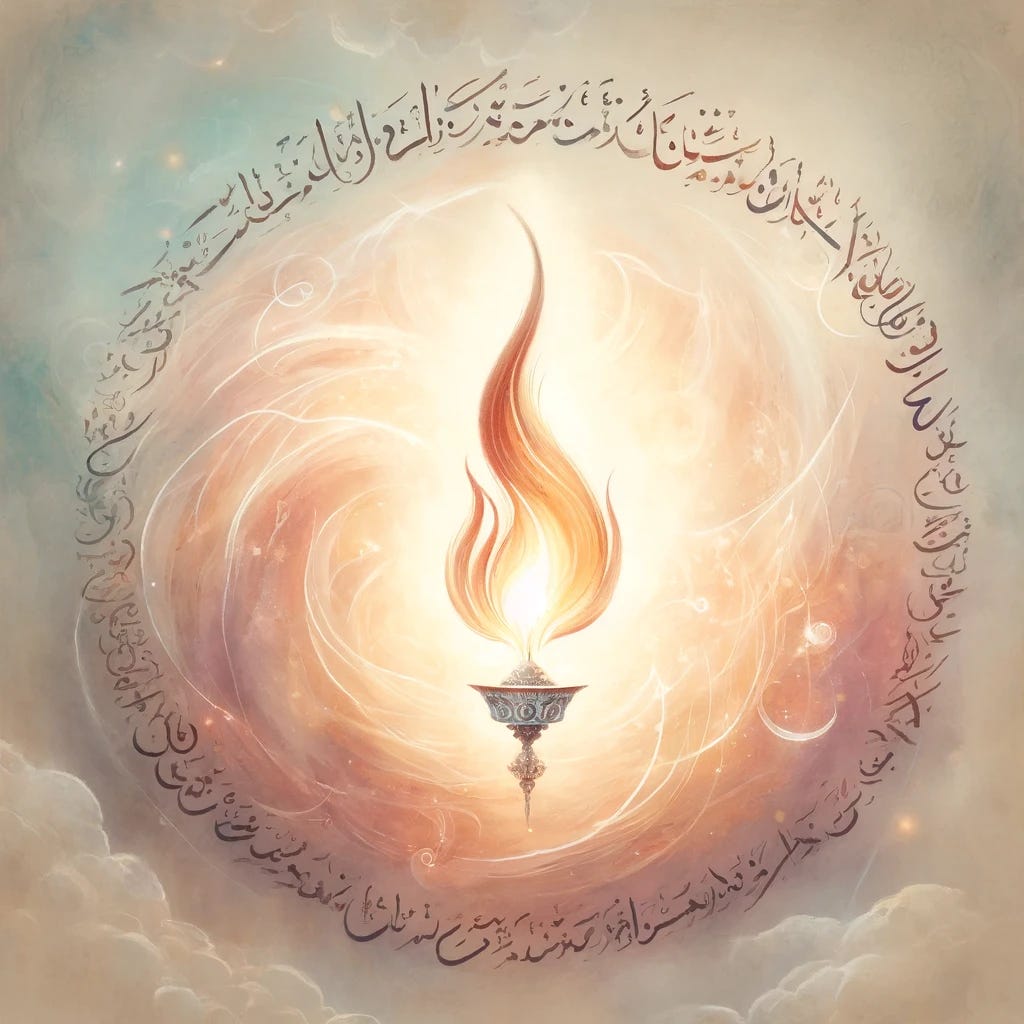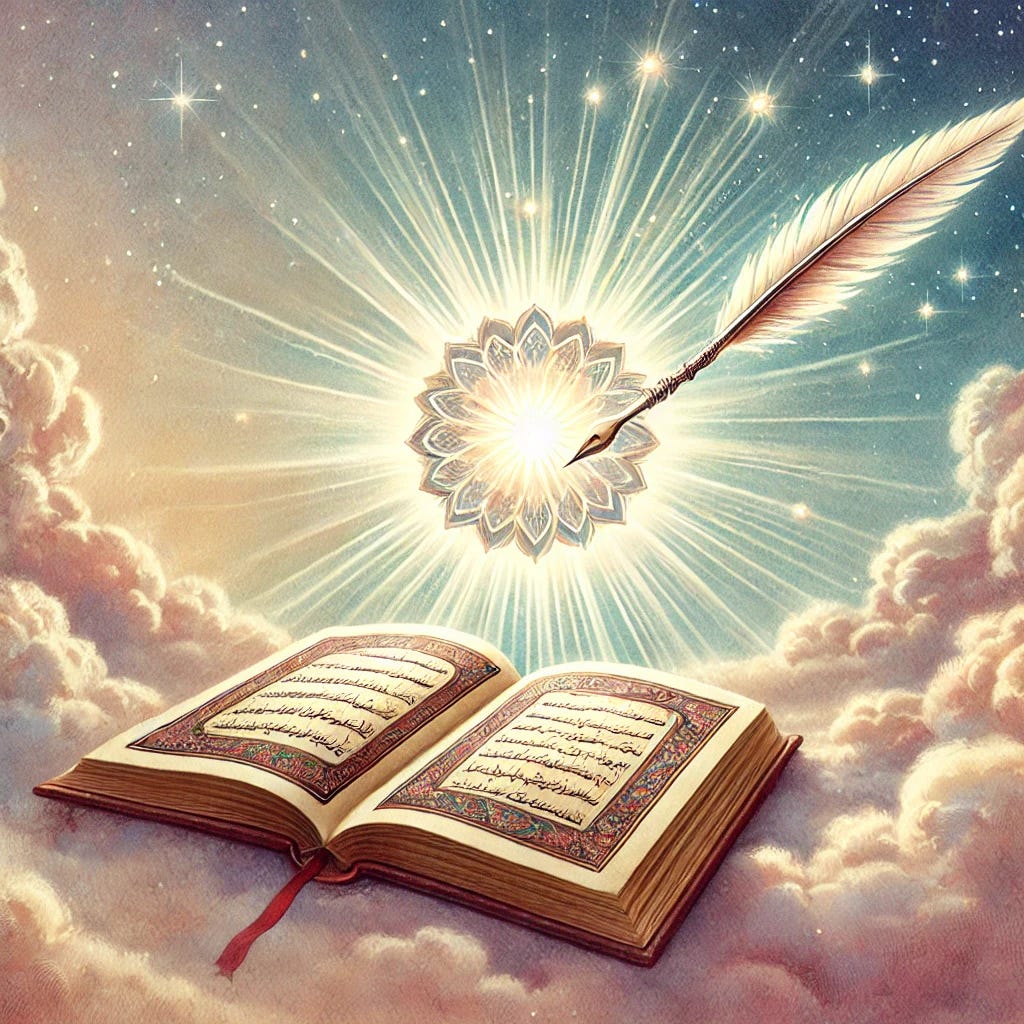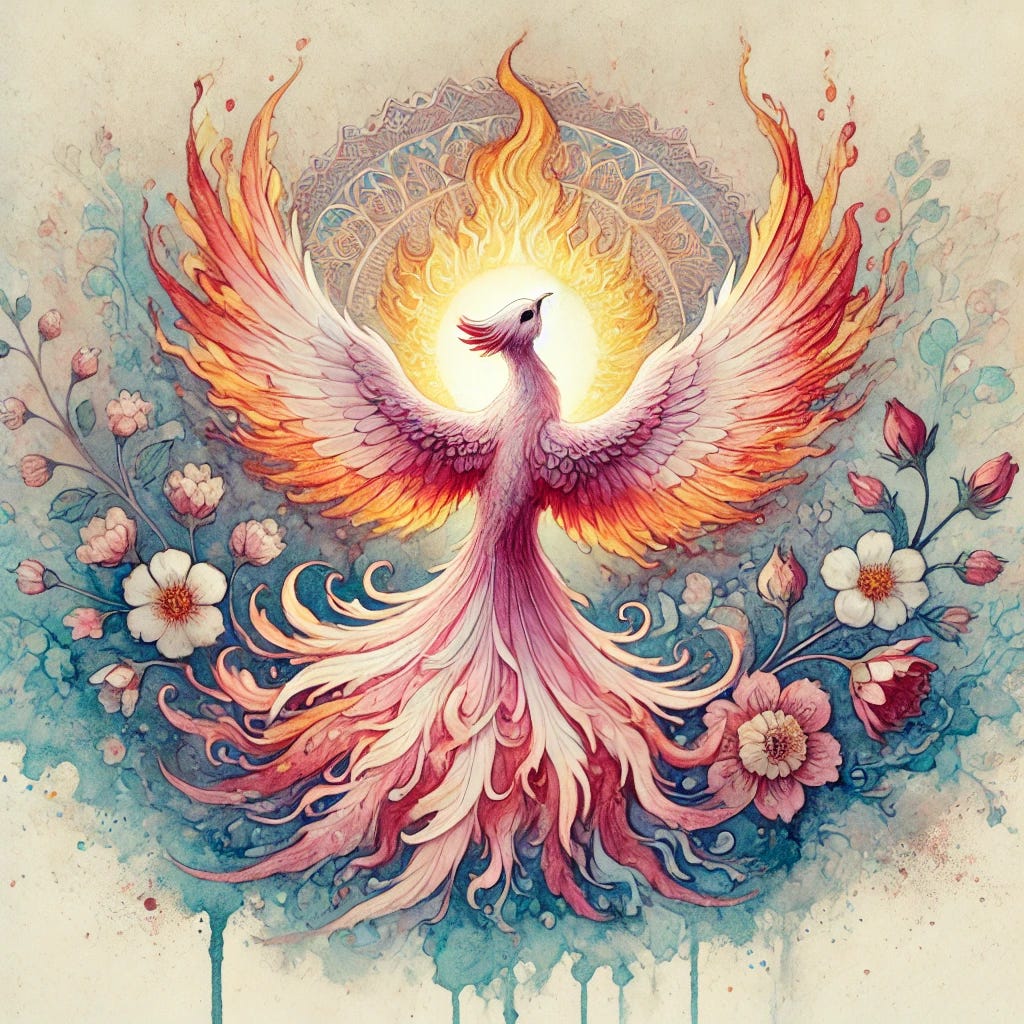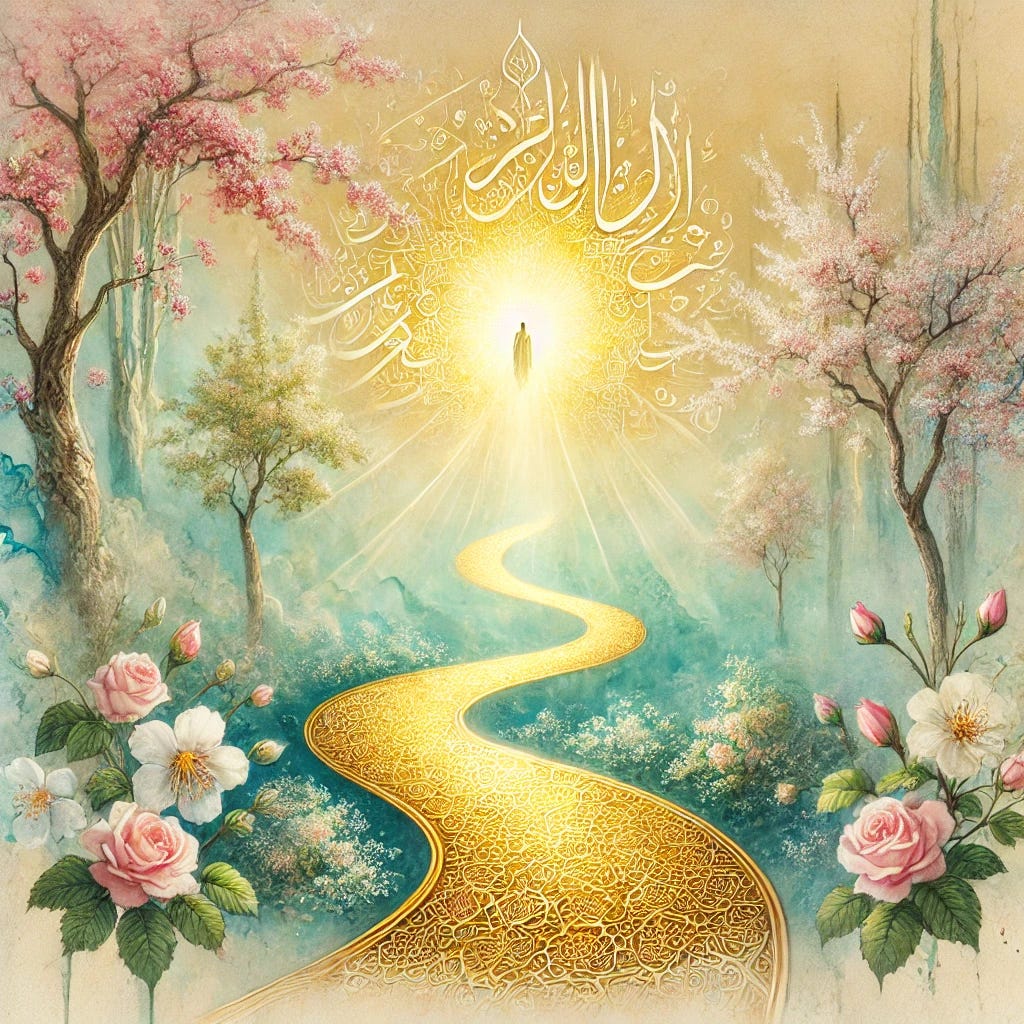[7] Prophethood - The Mission of the Prophets
A series of discussions on the teachings of Imam Sadiq (sixth Imam of the Muslims), from the book Misbah ash-Sharia (The Lantern of the Path)
In His Name, the Most High
This is part seven of an ongoing series of discussions on the book by Imam as-Sadiq titled ‘Misbah ash-Sharia’ (the Lantern of the Path).
It is strongly recommended that the previous parts are read, before proceeding with this one; to avoid any confusion or misunderstanding within the subject matter.
The nature of the subject matter, and the style of discourse requires that each part build upon those that came before it, so once more, I strongly recommend that the reader, read the previous parts, and then continue with this one.
The previous parts, can be found here:
Video of the Majlis (Sermon/Lecture)
This write up is a companion to the video majlis (sermon/lecture) found below:
Contents
Majlis - Misbah ash-Sharia - Servitude - Part 7
Nasheed: Imam Reza 2 - Hamed Zamani - English Subtitles
Ziyarah: Ziyarat Aal-e-Yaseen
Recap
In the previous session, we started our journey to understand the idea of prophethood. As part of this, we discussed and examined the philosophy of prophethood.
We began our discussion prior to tackling the subject of prophethood, by discussing the subjects of Tawheed (Monotheism or the Uniqueness/Unity of God) and Adalah or Adl-e-Ilahi (The Justice of God).
All these discussions are within our overarching discussion on the first hadeeth from the book attributed to the sixth Imam of the Muslims, Imam Ja’far as-Sadiq titled ‘Misbah ash-Sharia’ (the Lantern of the Path), and more specifically the first hadeeth from this book on the subject of Ubudiyyah (Servitude).
Within the subject of Servitude, we had covered the idea of ‘giving God that which is due to Him’, and we had moved onto the subject of ‘maintaining the limits He has set for us’.
This notion of ‘maintaining the limits He has set for us’ required us to understand and to reflect on what these limits are, which led us to discussing the baseline ideology, and that too, not in the traditional manner, but in a more holistic manner, and therefore we have now arrived at the subject of prophethood, and this is the second section in that subject.
In this session, we will be discussing the mission of the Prophets, this will include understanding the person of the prophet, what transformations take place in the person of the prophet when he is ‘raised’ (be’that) to be a prophet.
These are important concepts, and we pray that the One who in His infinite mercy sent the Mercy to Humanity to guide us, guides us here, so that we may too be able to recognise and gaze into His Beautiful Face.
With His Most Beautiful Names we begin.
Nubuwwah (Prophethood) - Part 2
Introduction
اقْرَأْ بِاسْمِ رَبِّكَ الَّذِي خَلَقَ
خَلَقَ الْإِنسَانَ مِنْ عَلَقٍ
اقْرَأْ وَرَبُّكَ الْأَكْرَمُ
الَّذِي عَلَّمَ بِالْقَلَمِ
عَلَّمَ الْإِنسَانَ مَا لَمْ يَعْلَمْ
كَلَّا إِنَّ الْإِنسَانَ لَيَطْغَىٰ
أَن رَّآهُ اسْتَغْنَىٰ
إِنَّ إِلَىٰ رَبِّكَ الرُّجْعَىٰRead: In the Name of your Lord who created.
Created man from a clot.
Read: And your Lord is the Most Generous.
He who taught by the pen.
Taught man what he never knew.
In fact, man oversteps all bounds.
When he considers himself exempt.
But to your Lord is the return.- Quran, Surah al-Alaq (the Chapter of the Clot) #96, Verses 1 to 8
In this session, we will be looking at the changes that take place in the person of the prophet, and in the world around him when God selects him to serve as His representative on earth.
When the Quran speaks about the Prophet, it speaks about his ‘appointment’ or be’that (raising up). The Quran says:
وَلَقَدْ بَعَثْنَا فِي كُلِّ أُمَّةٍ رَّسُولًا أَنِ اعْبُدُوا اللَّهَ وَاجْتَنِبُوا الطَّاغُوتَ ۖ فَمِنْهُم مَّنْ هَدَى اللَّهُ وَمِنْهُم مَّنْ حَقَّتْ عَلَيْهِ الضَّلَالَةُ ۚ فَسِيرُوا فِي الْأَرْضِ فَانظُرُوا كَيْفَ كَانَ عَاقِبَةُ الْمُكَذِّبِينَ
Certainly, We raised, in every community (nation), a messenger: “Worship God, and avoid idolatry.” Some of them God guided, while others deserved misguidance. So travel through the earth, and see what the fate of the deniers was.
- Quran, Surah an-Nahl (the Chapter of the Bee) #16, Verse 36
Over here, God is clearly saying that He has sent to every community - or nation, or grouping of people.
Indeed, we have all heard of prophets such as Abraham (Ibrahim), Moses (Musa) and other prophets, but did you ever consider what it means when God says that He ‘raised up’ a person - a prophet?
What is the connection between this ‘raising up’ and prophethood? This is what we will try to understand and get some clarity on, in this session.
The Mission of the Prophets
When we look at the Arabic word ‘ba’ath’ (بَعْث - to raise up) that is used in all these verses when referring to ‘raising’ the prophet, what does this actually mean?
It means to quicken something, to awaken it from a dormant state. For example, a person lies in their grave for hundreds of years, the body decays, but when God brings his body back and awakens him from his sleep, we say that God ‘raised him up’.
Indeed in Quran, when talking of the Day of Judgement (Qiyamah), which is also known as the Day of Resurrection:
وَقَالَ الَّذِينَ أُوتُوا الْعِلْمَ وَالْإِيمَانَ لَقَدْ لَبِثْتُمْ فِي كِتَابِ اللَّهِ إِلَىٰ يَوْمِ الْبَعْثِ ۖ فَهَٰذَا يَوْمُ الْبَعْثِ وَلَٰكِنَّكُمْ كُنتُمْ لَا تَعْلَمُونَ
But those endowed with knowledge and faith will say, “You remained in God’s Book until the Day of Resurrection. This is the Day of Resurrection, but you did not know.”
- Quran, Surah ar-Rum (the Chapter of the Romans) #30, Verse 56
A person may be asleep in their own home, or a person may be asleep as they go through the motions of their life. All his efforts and energies are not directed towards anything that goes against or is contrary to the flow of the society in which he lives.
Like a piece of driftwood floating in the current of his social situation, carried in whichever direction society takes him.
When a person in such a condition, comes out of this state of indifference, as he comes to his senses we can say, he realises there is nothing inevitable about this path or flow. He discerns that he does not need to accept this status quo; that he doesn’t need to be content with it, that he doesn’t need to passively accept this.
Indeed, he can take another pathway, a pathway that will lead to his flourishing and towards human happiness.
When the mind of a human awakens, this is when you witness real effort, real movement. When this happens; you say that this person has ‘risen’.
This is the meaning of ‘to raise up’ - this is what ‘bi’that’ (بِعْثَة) means.
The Day of Judgment is also referred to as the Day of Resurrection as we’ve said - and this is also - as mentioned in the earlier verse referred to as ‘يَوْمِ الْبَعْثِ’ (Day of Raising).
This resurrection is of course when all the dead are raised up alive and brought forth from their slumber. It is a day of movement, a day on which human beings, from the moment they come out of their state of headlessness until their final destiny is decided, will always be striving, scrambling and moving. We will cover this idea of the Day of Judgement or the Day of Resurrection, in a future session, God willing.
Prophethood shares something in common with this idea of resurrection - indeed Prophethood is for the revival of the soul.
A Fresh Look at Prophethood
Some look at the notion of prophethood as a preacher coming to a city to teach it’s inhabitants a little about religion, or perhaps as a scholar sitting to answer people’s questions, or a lecturer standing up in a meeting to deliver a speech on a given topic.
That is how, generally, people look at the idea of prophethood, like a pious religious scholar in the midst of some people.
Indeed, we may even imagine, that people might respect him because he is ‘good’, and we call them believers; we also imagine that some people might disrespect him because they are ‘bad’ and we call them disbelievers and idolators.
This, in general, is how we imagine prophethood is.
However, when someone becomes a prophet, they undergo a kind of transformation. We might even say that they undergo two transformations.
The first being, that the being of the prophet undergoes a form of resurrection, a metamorphosis in the very core of his own self. We could say that he is changed - brought forth from a slumber, as a raising of his spirit takes place. This is like an internal resurrection within himself.
A resurrection of his own heart and mind. Through this process, God awakens all of his potential, much like a well from which there erupt a million streams, with all this water having been contained in the ground just moments before.
With the transformation having taken place, the prophet is now totally under the influence of divine revelation - once this spring has burst forth from the depths of the prophet’s heart - he now takes his message to the people.
The waters of revelation flow out from him, and into the fabric of society, with the transformation that began in him, now spreading to his people, to his community, to his nation, and indeed to the world around him.
The resurrection that took place in his heart, is mirrored in an even more magnificent resurrection in his society.
Through his efforts, the transformation in his heart brings about a transformation in society and a true ‘raising up’ takes place.
Therefore, we can see that from every aspect, prophethood, is a kind of raising up or resurrection - whether in the person of the prophet himself, or within the society he has been sent to.
The Prophet Before Prophethood
So, now a question comes to mind. What was the prophet before he became a prophet? Before he was - as we’ve explained - ‘raised up’?
There are two points that apply to all prophets before they were chosen by God.
The First Point
Firstly, even though a prophet has not yet been raised up, he nevertheless displays remarkable potential as a human being - much more than those around him.
He is both mentally and physically very able. His readiness for the spring of revelation to burst forth from him is not comparable to other people. His readiness to worship God and to serve God is to an extent that cannot be conceived in other people.
All the other potentialities that lay dormant and buried in other people are already present and visible in him. He has reached the zenith of the arc embodied in ‘to God we belong and to Him we return’.
In other words, he is a true servant of God, and he has embodied the moral qualities of God.
Why should this be more in him than anyone else?
It is this way, because the prophet must be ready to bear the burdens of being a prophet. He must be ready to ensure hardships associated with this role. Being God’s representative on earth is not an easy thing. Delivering the divine message to mankind and changing an ignorant society into a Tawheed (monotheism) oriented one is not an easy or trivial task.
This is a momentous undertaking and one that ultimately not all people can bear to be charged with.
Who could accomplish this? An ordinary human being? Or does this require someone who, based on the condition of his environment, family and society, enjoys a greater potential?
Who, because God recognises this potential and sees that it will help this person achieve his mission, pours out His grace and kindness upon him, who nurtures and chooses him, so that he can carry this heavy burden?
Ultimately if God’s messengers did not carry this burden, you and I would not be able to carry ours, and our work in the world would be left incomplete.
The work of men like Nelson Mandela, Patrice Lumumba and Thomas Sankara would be left unfinished. The work of Plato, Aristotle and Socrates would be left unfinished.
There must be someone strong enough to carry the burden, that is the burden of the divine message of prophecy, of ‘raising up’ - or any other name we would give it - and this is not a simple thing to achieve.
There must be someone amongst humanity that has this kind of potential.
So this is the first point: before he is a prophet, a prophet is someone who has potential and abilities beyond those of an ordinary human being.
The Second Point
The second point is that a prophet, before he is chosen and made a prophet, lives amongst the people and interacts with them normally. He is not necessarily someone who spends his days thinking about what he must do to change society.
He may be unhappy with the way society is, and he most certainly is. He is an intelligent person, who is unhappy with the divisions he sees in society. From the ignorance he sees in society. From the poverty he sees in society. From the injustice he sees in society - or to use an Islamic term - from the ‘jahiliyyah’ (جاهلية - ignorance) of the time in which he lives.
However, this is all - at this stage. He is not actively planning to stage a revolution, or to overthrow the existing social order.
Moses and Pharaoh
Consider, Moses (Musa). He grew up in the household of Pharaoh. He had all the benefits of being a ‘prince of Egypt’. Then once, in the marketplace, he struck down an Egyptian official who was mistreating an Israelite, and he was forced to flee.
Then, after years of working for the Prophet Jethro (Shuayb), he - Moses - receives a revelation from God and is made His prophet.
Then, when he returned as a prophet, and was asked why he struck down that Egyptian man, he said:
قَالَ فَعَلْتُهَا إِذًا وَأَنَا مِنَ الضَّالِّينَ
He said, “I did it then, when I was of those astray.
- Quran, Surah ash-Shu’ara (the Chapter of the Poets) #26, Verse 20
What did he mean by that? It means that he - Moses - had not yet found the right way to oppose the direction that society was taking under Pharaoh’s regime, not that killing one of Pharaoh’s officials was a grave crime, not at all.
What he means by this is that when he did that, he was not someone following a specific ideal - he was not following the right way to bring about change. He was just one person amongst many. He followed the same path as everyone else.
He did his best as an ordinary person amongst other ordinary people.
Now, he has returned, changed, to his society. Now he is leading a movement to change society in its entirety.
In other words, he is now a person ‘raised up’ in society. Since when? Since his ‘bi’that’ (بِعْثَة).
Since his ‘raising up’ as a prophet.
An Interpretation of Surah adh-Dhuha (the Morning Light)
We can see the same about our Prophet - peace and blessings be upon him and his family and righteous companions - in the opening verses of Surah adh-Dhuha (the Chapter of the Morning Light):
وَالضُّحَىٰ
وَاللَّيْلِ إِذَا سَجَىٰ
مَا وَدَّعَكَ رَبُّكَ وَمَا قَلَىٰ
وَلَلْآخِرَةُ خَيْرٌ لَّكَ مِنَ الْأُولَىٰ
وَلَسَوْفَ يُعْطِيكَ رَبُّكَ فَتَرْضَىٰ
أَلَمْ يَجِدْكَ يَتِيمًا فَآوَىٰ
وَوَجَدَكَ ضَالًّا فَهَدَىٰ
وَوَجَدَكَ عَائِلًا فَأَغْنَىٰBy the morning light.
And the night as it is calm.
Your Lord has neither forsaken you, nor is He displeased with you.
The Hereafter (or future) is better for you than the world (or the past).
Soon, your Lord will give you (that with which) you will be pleased.
Did He not find you an orphan, and shelter you?
And did He not find you astray, and guide you?
And found you in need, and enriched you?- Quran, Surah adh-Dhuha (the Chapter of the Morning Light) #93, Verses 1 to 8
There are many narrations (traditions/ahadeeth) about these verses; but many of these are interpretations (ta’wil), rather than explanations (tafseer), this is because they go beyond the apparent meaning of the words.
This indicates that the Imams have derived something more from the verse than its apparent meaning. It should be noted that this does not mean that the Imams wish to interpret the verse in a way that goes against its apparent meaning - the apparent meaning is always preserved and it always has its place - rather it means that they seek to draw out the non-apparent aspects of the verse.
Things that, when we look at the verse, we would not grasp by ourselves, which is why the Imam wishes to teach them to us. This is the meaning of ‘ta’wil’ (interpretation).
The chapter begins by swearing an oath:
By the morning light.
This oath, in and of itself, is something that is very meaningful. It is an oath sworn by a particular time of the day. Perhaps, this contains an allusion or intimation for the audience, as the rest of the verses clearly concern the sending of the Prophet.
‘The morning light’, symbolises a new light dawning across the horizon of the world with the appearance of the Prophet of Islam and the advent of the new divine message for humanity.
Next, the Quran says:
And the night as it is calm.
Now, the Quran swears by the night, when the sky is completely dark.
Your Lord has neither forsaken you, nor is He displeased with you.
It seems that when the Prophet of Islam started receiving revelations, there was a period of time in which the revelations stopped. So, after the spiritual excitement felt by the Prophet upon his meeting with Gabriel, he underwent a dark night of the soul, a time when he received no new revelations.
This, of course, saddened him deeply. How long did this period of silence last? Some say that it was 40 (forty) days, some say more to the extent of two or three years.
Then came relief, in the form of Surah adh-Dhuha (the Chapter of the Morning Light), which gave great hope and good news to the Prophet with the words:
Your Lord has neither forsaken you, nor is He displeased with you.
The Hereafter (or future) is better for you than the world (or the past).
Soon, your Lord will give you (that with which) you will be pleased.
Indeed the verse - ‘Soon, your Lord will give you (that with which) you will be pleased' - there is a narration about this verse which says the thing that will please the Prophet is the power of intercession (shifa’ah).
According to Imam Khamenei, this is entirely correct, as the power of intercession is one of the things that God granted the Prophet and He granted it to him to the extent that he was contented.
Even in this world, God gave the Prophet enough for him to be pleased; He gave him the power to guide others, to establish an ideal society, to defeat his enemies and to liberate lands, to guide the new Islamic society towards perfection - these are the blessings that God granted His prophet.
Then God asks:
Did He not find you an orphan, and shelter you?
God found an orphan, a nobody who had no shelter, and He gave him shelter. This orphan had no father, for his father had died before he was even born. His mother died shortly after. His grandfather died a few years later. He would have been utterly alone in the world, had his uncle, Abu Talib, not taken him in.
In asking the Prophet this rhetorical question, God is actually telling him:
‘You began your life as an orphan, but We were always watching over you, We looked after you with Our kindness and Our mercy’
This is to give the Prophet hope. It is meant to remind him that God’s protection and shelter was, is, and will always be with him. From his childhood until now, with the heavy responsibility of prophethood weighing upon his shoulders.
So, God is telling the Prophet:
‘Do not be afraid. Do not worry. Do not imagine that God would ever leave you. God would never leave you, not after He brought you all this way.’
We then have the verse from Surah adh-Dhuha which reads:
And did He not find you astray, and guide you?
There are also several narrations (traditions, ahadeeth) about this verse, according to Imam Khamenei’s research, some of these are weak and others have been mixed by remarks from commentators on the Quran.
But what does God mean by the verse:
And did He not find you astray, and guide you?
But does this not mean that the Prophet was astray in his ideas and spirit? It is in fact a far more literal meaning than this:
It means that when the prophet was a child, he became lost as he wandered around the hills surrounding Makkah, but God guided his grandfather to find him. Another time, when he was lost as a child, a woman found him.
Alternatively, the verse could be read as saying that the people of Makkah did not know who you (Prophet Muhammad) were, until God guided you to them.
There are different meanings and understandings of this verse.
Now, according to Imam Khamenei, he does not reject any of these out of hand, he says all of them are possible and, if we find the narrations (traditions or ahadeeth) that are genuinely authentic about any of these readings, then we should accept them without hesitation.
Perhaps the narrations we have about this verse are weak, perhaps they are strong. Indeed if any of the strong narrations on this topic reflect any of the readings we have discussed, then certainly they are to be accepted.
However, even if all of the narrations are possible, and we accept them on the basis of authenticity, they do not properly reflect the apparent meaning of the verse - though that doesn’t mean we reject them either.
Looking at the apparent meaning of this verse, does it mean to say that the Prophet was previously ‘astray’ (ضَالًّ - ‘dhaal’)? Does it mean that he was previously an idol-worshipper? Of course not!
Does this mean that he was someone who was misguided? Certainly not!
Does it mean that he was a sinner? Definitely not!
So what does it mean?
It means that this straight path that was shown to you, through you being chosen as a prophet was not previously available to you. Could it mean anything other than this?
Were these teachings, these laws, these concepts, these ideas which the Prophet received via revelation, which were made clear and manifest to his pure heart, something he had in possession before God selected him and raised him up as a prophet?
No, certainly they were not.
Therefore, we can deduce that the meaning of ‘being astray’ reflects the apparent meaning of the words of the verse, and once we have this apparent meaning; there is no problem with us applying the verse to mean being ‘lost amongst the people of Makkah’, or ‘being lost in the hills around Makkah’, or ‘being lost searching for sheep that wandered off’, as we find in some other verses.
Following this verse; God says:
And found you in need, and enriched you?
What does this verse refer to? With the previous verse, we saw that the Prophet was lost or astray even as he moved amongst the ordinary people and lived in society, even if he was not happy with the conditions he witnessed here:
For example, there is an occasion in which some of the notables of the Quraysh badly mistreated a poor man’s servant girl, and the other wrongs he saw around him. As a result, he joined the ‘Alliance of the Virtuous’ (Hilf al-Fudhul - حلف الفضول).
While he lived as an ordinary person; he still never associated any partners with God, nor made any offerings, nor showed any reverence for the idols, and he never allied himself with the rich and powerful.
Instead he lived as a noble and decent member of society. Therefore, whatever the prophet did before he became a prophet of God, was within the normal boundaries of the society in which he lived.
Alliance of the Virtuous - حلف الفضول
Since we have mentioned this group named ‘The Alliance of the Virtuous’ - that existed in pre-Islamic times; and that it is a group that Prophet Muhammad joined; it would be perhaps valuable to very briefly discuss it:
Hilf al-Fudhul, or the Alliance of the Virtuous, was a pre-Islamic pact established in Makkah to uphold justice and protect the oppressed. This alliance has been acknowledged by all Islamic Schools - both from the Sunni and from the Shia.
According to historical records, Hilf al-Fudhul was formed after a Yemeni merchant was wronged by a prominent Makkan, As ibn al-Wa’il, who refused to pay for goods he had acquired. The merchant’s appeals for justice were ignored until he publicly protested, prompting the Prophets uncle - Zubayr ibn Abd al-Muttalib - to take action.
Zubayr convened a meeting at the house of Abdullah ibn Jud’an, where many members of the various clans such as Banu Hashim, Banu al-Muttalib, Banu Zuhra, Banu Taym, and Banu Asad pledged to support the oppressed and ensure justice in Makkah.
A number of sources, have also indicated that the Prophet Muhammad himself was present during the formation of the Hilf al-Fudhul, and he says:
"(together with my uncles) I witnessed a pact in the house of Abdullah ibn Jud'an which I would not like to break even if all red-hair camels are given to me and if today I was invited to it again, I would accept it.”
Ibn Hishām, al-Sīra al-Nabawīyya, vol. 1, p. 141-142;
Ibn Saʿd, al-Ṭabaqāt al-Kubrā, vol. 1, p. 129;
Ibn Ḥabīb, al-Munammaq fī Akhbār Quraysh, p. 53;
Balādhurī, Ansāb al-Ashrāf, vol. 2, p. 24, 26-27.
It is said in the books of history that they all made an agreement, in the house of Abdullah ibn Jud'an, with each other that if any foreigner or anyone from Makkah is treated unjustly, they would help him reclaim his right from the oppressor. They would prevent the oppressor from oppression, prohibit evil and help the needy in their day-to-day living.
Indeed, the Hilf al-Fudhul is considered one of the most honourable and noble pacts which remained with the Arabs until that time, and its importance can be further understood, when we learn that it was used as a means and bases for determining dates prior to the advent of Islam.
The Flame of Revelation
So, the Prophet lived as an ordinary person of virtue and decency until one day, he receives revelations from God. This produces a profound transformation in his being and his character.
The transformation was so powerful and strange, that it even appears to have had an effect on the physical being of the Prophet as well as his psyche.
When the Prophet was in the cave, and the first flicker of revelation was kindled in his heart, he saw a heavenly messenger telling him to read - “اقْرَ - Iqra - Read!”.
Now, either the Prophet could not read anything or did not have anything to read, so he said - Ma Aqra - (ما أقرأ), which could mean either ‘I cannot read’ (in which case the Arabic ما (Ma) is for negation), or it can mean ‘Read what?’ (in which case the same ما (Ma) is in its interrogative form).
As the Prophet said that, the first verses of the Quran were revealed to him:
اقْرَأْ بِاسْمِ رَبِّكَ الَّذِي خَلَقَ
خَلَقَ الْإِنسَانَ مِنْ عَلَقٍ
اقْرَأْ وَرَبُّكَ الْأَكْرَمُ
الَّذِي عَلَّمَ بِالْقَلَمِ
عَلَّمَ الْإِنسَانَ مَا لَمْ يَعْلَمْ
كَلَّا إِنَّ الْإِنسَانَ لَيَطْغَىٰ
أَن رَّآهُ اسْتَغْنَىٰ
إِنَّ إِلَىٰ رَبِّكَ الرُّجْعَىٰRead: In the Name of your Lord who created.
Created man from a clot.
Read: And your Lord is the Most Generous.
Who taught by the pen.
Taught man what he never knew.
Indeed, humanity became rebellious,
When he sees himself without need.
Indeed to your Lord is the return.- Quran, Surah al-Alaq (the Chapter of the Clot) #96, Verses 1 to 5
The flame of revelation was lit within the soul of the Prophet and a great change took place. This thinking person - this virtuous person - underwent a complete transformation. He was raised up. He was not the same person as he was before.
Muhammad was no longer the Muhammad of one moment ago. He was not the same being as he had been an hour ago. He was now something else. He was of a different substance entirely.
Firstly, being chosen as a prophet brought about a complete transformation of his own inner being, and once this was accomplished, he was now ready to transform the world around him.
If he had not changed, he could not change the world. This is an important lesson for those who follow the Prophet.
As long as they have not changed, they cannot change the world around themselves. As the Sufi poet, Jami says:
“An essence that has not been granted existence from the Giver of Existence,
How can it become a giver of existence to others?”
- Jami
You, who did not give rise to your own existence, who has yet to make use of this outpouring of grace and blessings from the light of the Creator, who has yet to leaven his spirit with it, what do you have to offer people?
You must first be burning yourself before you can set the cold black coal ablaze!
So, the Prophet was first set ablaze himself. He was first transformed and changed in his own being. He first felt the quickening of the Resurrection in his heart. Only then could he bring new life to the world. He became a person who was ready to surrender his life but never his ideals.
Could it be any other way? This was no joke. Was it a joke when they tortured Bilal to within an inch of his life? But though they whipped him over and over under the burning sun, he would call out:
‘He is one, one, one - there is only one God!’
By saying these words, it was as though he was calling out for his own death. It was no easy thing for the prophet to raise up men like this. By himself, the Prophet could not make an Abu Dhar, or a Bilal, or a Miqdad, or an Abdullah ibn Masoud.
No, first the Prophet needed to be changed himself. Can we now see what the revelation did to the Prophet? Can we see what it demanded of him?
Read in the name of your Lord who created
Let us now look at the verses of the Chapter of the Clot, Surah al-Alaq (Chapter #96). The first five verses of which were the first verses to ever be revealed.
The chapter begins with the verse:
‘Read in the name of your Lord who created’
The first thing that a true monotheist like our Prophet, who had never worshiped idols, will recognise, that will draw the heart towards God, is perhaps the simplest of all truths - that of creation.
‘Read in the name of your Lord who created’, all creation belongs to Him, therefore, everything we see, is a manifestation of His power.
Once this idea has crystallised in someones mind, he goes a step further. He goes a little higher than creation:
‘Created man from a clinging mass (clot)’
What distinguishes the human being from any other creature? The human being does not begin his existence as aware of himself or his surroundings.
In a street, a car passes by. A person passes by. You ride in a car. Ten people pass by. Ten trees pass by. What is the difference?
If you don’t pay attention, then trees and people can seem very alike as you pass them by.
But the human being is a very special kind of being - he is higher, superior.
People who do not think, might never work out the difference between a human being and anything else, because a thousand people mean no more to them than a thousand ants.
Indeed, just as you would dispose of a swarm of ants without a second thought; so too, would some people cast aside a crowd of humans just as easily. But we don’t want anything to do with such people.
Now, at a first glance, it might not be clear why a human being is any more important than anything else in the universe. But what about when you really pay attention? Then what? You see that there is indeed an important difference between human beings and other things - a profound difference.
What is it that separates the human being from everything else? The power of thought, of intellect, of knowing universal truths, of deriving general laws from particular instances.
This is not something that a tree can do, nor can a rock do this, nor any other animal, invention, innovation or discovery - if the human being could not invent, then the human race as a whole would have remained forever the same and unchanged, like everything else - just like the example of the honey bee that we had in the previous session.
The human being is distinguished because he has will power, can make decisions, can choose between what he wants to do.
This is unlike all other creatures, who can only follow their instincts. Whatever their instincts tell them to do, they follow. There is no case of ‘wanting’ or ‘wishing’.
But for the human being, he has the ability to act against his instincts. It is a human instinct to eat food. It is a human instinct to sate one’s sexual desires. Yet, you can find people who have never succumbed to their sexual desires in an entire lifetime. Yes, this is getting rarer in our times, but this is still a fact.
This is because the human beings can deny their instincts. They can work on themselves. There are human beings that can sustain themselves for an entire day on just a single almond without eating anything else.
So, it is only the human being that can choose to ignore his desires and instincts.
To put it simply; it is the human beings power of thought, choice, will and innovation that sets him apart from other creatures. There is nothing else in existence that rivals the human being in this way.
Scientists have indeed come to the conclusion that the human being is unique amongst species in this regard.
They still maintain that the human being is an animal, but they recognise that only the human being possesses certain qualities. And all of these qualities we find within the human being are the result of God’s outpouring of His spirit upon him. It is in the manifestation of God’s spirit in the human being:
فَإِذَا سَوَّيْتُهُ وَنَفَخْتُ فِيهِ مِن رُّوحِي فَقَعُوا لَهُ سَاجِدِينَ
When I have formed him, and breathed into him of My spirit, fall prostrate before him.
- Quran, Surah Saad (the Chapter of (the Letter) Saad) #38, Verse 72
So, the Prophet realises that there is something higher still than mere creation, and that is the creation of the human being, the creation of reason, the creation of thought and understanding. And from where do they come?
From ‘a clot’. What a journey it takes from a clot to be a fully formed human being!
How can something inert and unliving, be transformed into a thinking being? To be transformed into a person like Socrates, into a thinker, a philosopher, a prophet. How is this possible? Is there any other explanation, except that this is the work of the Creator?
‘Created man from a clinging mass (clot)’
Our Prophet, at the very beginning of his revelation, was made aware of this extremely profound realisation. See how God wishes to bring about a complete transformation in his being?
He wants to shoe him in steel and place a steel rod in his hand, so that he can go forward, so that he will never again know the meaning of tiredness. The first step of this process of transformation can be found in the words of this verse ‘Created man from a clinging mass (clot)’.
‘Read: And your Lord is the Most Generous.’
The command ‘Read’ repeats, because God is even greater still, ‘and your Lord is the most generous’. Why is He the most generous?
‘Who taught by the pen’
Now, as the Quran speaks to the Prophet of the education of the human being. As everyone knows, if there was no pen, there would be no writing and if there was no writing, there would be no progress for the human race.
The means by which one generation can pass its knowledge onto the next, and then that generation can pass its knowledge to the next, so that each new generation can utilise the collective learning of the human species and draw upon the experiences of earlier people, is only through the pen.
If the previous generations had not written down their scientific researches and their discoveries, then we would not have had access to them. Therefore, we would not have made use of them.
If Avicenna (Ibn Sina) had not been able to read the books of Aristotle, then Avicenna would not have become Avicenna, who rose even higher than Aristotle.
If Shaykh al-Ansari or Mirza Shirazi did not have the books of jurisprudence of Shaykh at-Tusi or Allamah Hilli, and that knowledge and ideas that they contained, they would never have been able to become two of the most outstanding jurists (fuqaha) to be seen for centuries.
This is self-evident.
If a person has 5 pounds (GBP), and he gives it to another person who adds 5 pounds making 10 pounds, and then gives it to a third person, who in turn adds another 5 pounds, thereby bringing the total up to 15 pounds. This makes the last person the richest of the three. But where did the 15 pounds come from?
Without the first person in the chain, would the total amount of funds be 15 pounds? If it wasn’t for the second person in the chain. Indeed, the third person would have contributed a mere 5 pounds to build the total up to 15 pounds.
The sum of human experience and discovery which is passed onto subsequent generations accumulates like these 15 pounds. But what is the means by which it is handed down? By what device are we able to accomplish this? By writing, writing with the pen.
Therefore, teaching the human being with the pen is an act of God, even greater than creation itself.
‘Taught man what he never knew’.
These are the blessings which God has bestowed upon the human being. The human being should give thanks for these.
When God taught the human being, when God showed the human being the right path, when He gave the human being the pen, when He gave the human being intelligence and knowledge, the human being should always be going higher and higher and never, not even for one moment, going backwards or descending, for therein lies human misery.
Is this not the case?
The next verse provides the answer, almost as if God anticipated the question:
If God created man, taught man, gave man the pen, cared for man and emboldened him - if God did all of this for the human being, then the human being should never be miserable, should never be lost, should never allow himself to become corrupted or led astray.
Should this not be the case?
Unfortunately, it is not as we may have hoped. It is not as we think. Have we seen the state of humanity today?
“Indeed, humanity became rebellious,
When he sees himself without need.”
It is the obstinacy of humanity, its arrogance and pride that has led them to rebel against the Most Merciful, and to fight one another.
This is the source of humanity’s misery and pain.
These tyrants will not allow humanity to be guided. The wrongdoing, vain and arrogant ones do not want to let humanity make the most of it’s God given blessings, or even for God to educate them as He wills.
This is because such folk see themselves without need, and they make others see themselves as being without need, so they become arrogant and rebellious. They turn from the path of God, indeed they even feign religiosity, while abusing and manipulating both God, as well as the population.
But, look at how merciful, how loving, how kind, how truly amazing God actually is, that even amidst all of this He continues to remind people of His kindness, His love, His generosity, His teaching. He continues to remind people of the fact that He is their creator, their sustainer, their nourisher, that He desires that humanity reach its full potential.
He keeps telling, keeps educating humanity, of the fact that they have not achieved their potential, and the reason for that, that the fault lies in the rebellious ones, who seek to confuse and misguide, to distract, to occupy humanity with things that put the mind in a comatose state, that prevent the blooming of thought, of reflection, and they attempt to bar the path of truth, and work against those who promote the Truth.
Such folk are rebellious because they feel they are invincible, that they do not need anyone aside from themselves. They amass huge wealth - while their neighbour goes to sleep hungry, they hoard treasure, while the people are unable to put food on their tables, they pile up money, so much so that it will be impossible for them to spend, and those who work for them live in squaller.
They make humanity bow to them, they consider themselves greater than the people on account of their status or wealth and such things.
When this happens, when ungodly powers are brought into this world, this is when the human race fails to reach its destination.
This is the inspiration God sends to His messenger at the very beginning of his mission. This is the flame that God lights in his heart.
Do we expect humanity will become enlightened, will become guided without His help, guidance and love? No, not at all.
“Indeed to your Lord is the return.”
But will the rebellious ones have a successful outcome? No, they will all return to their Lord. The outcome is with God, is always with God, is only with God.
The ultimate end is towards God and with God. The way that God, the Creator, has laid down is the way that humanity must follow, for if they do, there is then no doubt, that they will reach their destination, and indeed be successful.
Finally, before we conclude this session, it is important that we understand there are many, many other issues, that are worthy of discussion that arise from this subject of what is the mission of the prophets, what is and how is their transformation, and such.
Do we not see, from our brief discussion here, the realities of our Prophet, and the transformation that took place within him, and the transformation that he was ultimately able to bring to the world?
The Revealed Revelation
وَالنَّجْمِ إِذَا هَوَىٰ
مَا ضَلَّ صَاحِبُكُمْ وَمَا غَوَىٰ
وَمَا يَنطِقُ عَنِ الْهَوَىٰ
إِنْ هُوَ إِلَّا وَحْيٌ يُوحَىٰ
عَلَّمَهُ شَدِيدُ الْقُوَىٰ
ذُو مِرَّةٍ فَاسْتَوَىٰ
وَهُوَ بِالْأُفُقِ الْأَعْلَىٰ
ثُمَّ دَنَا فَتَدَلَّىٰ
فَكَانَ قَابَ قَوْسَيْنِ أَوْ أَدْنَىٰ
فَأَوْحَىٰ إِلَىٰ عَبْدِهِ مَا أَوْحَىٰ
مَا كَذَبَ الْفُؤَادُ مَا رَأَىٰ
أَفَتُمَارُونَهُ عَلَىٰ مَا يَرَىٰBy the star, when it sets,
Your companion has neither gone astray, nor (has he) gone amiss.
Nor does he speak out of desire,
It is but a revelation, that has been revealed.
Taught (to) him by One of great powers,
Possessed of sound judgement. He settled.
While he was on the highest horizon,
Then he drew nearer and nearer,
Until he was within two bows lengths, or even nearer.
Whereat He revealed to His servant what He revealed.
The heart did not deny what it saw.
Will you then dispute with him about what he saw?- Quran, Surah an-Najm (the Chapter of the Star) #53, Verses 1 to 12
There are many chapters and verses of Quran that discuss these subjects and that address these and related important points; but we can conclude by discussing some verses from the chapter of the star (Surah an-Najm), which is the 53rd chapter of the Quran, and then we will, God willing, conclude with an understanding of this subject, of the mission of the prophets, and what it entails and how it transpires, and indeed what it means, and why.
“By the star, when it sets,
Your companion has neither gone astray, nor (has he) gone amiss.”
According to many commentaries, these verses related to the Night of Ascension (Laylat al-Me’raj). However, they are also related to changes taking place within the Prophet, and the state he enters when receiving revelation.
This chapter was revealed after the Night of Ascension; when the Prophet tried to explain to people about this, they refused to listen to him. This is just the context of the verses.
“Nor does he speak out of desire,
It is but a revelation, that has been revealed.
Taught (to) him by One of great powers,
Possessed of sound judgement. He settled.”
The word ‘sound judgement’ (مِرَّةٍ - mirrah) - means wisdom and discernment. The various commentators of the Quran, say that this refers to the Angel Gabriel (Jibreel), as the Prophet relates whatever Gabriel says to him, and Gabriel relates whatever God has told him.
Therefore, it is through Gabriel that God teaches the Prophet.
“He settled”, the revelation was given to him, and he rose to his feet.
“While he was on the highest horizon,
Then he drew nearer and nearer,”
The word ‘the highest’ (الْأَعْلَىٰ - al-a’alaa), is a reference to the supreme horizon.
“Then he drew nearer and nearer”. Perhaps we can try to explain this as follows:
While he was on the highest horizon, meaning that before he became a prophet, he was at a higher level as compared to those around him, and it was being at this highest level and enjoying superior potential, this meant that he could be chosen as a prophet.
“Then he drew nearer and nearer”, based on the reading we have just given, the Prophet drew ever nearer to God, then nearer still as a result of his worship and spiritual exercises, and as a result of his meditation, reflection and contemplation, as a result of the grace that God bestowed upon him.
His spirit came nearer and nearer to God, until it was ready to receive revelation.
Some commentators of the Quran, have suggested that the sentence ‘he drew nearer’ (dana - دَنَا), is actually a reference to Gabriel. Drawing the Prophet near “and nearer” (tadalla - تَدَلَّىٰ) refers to Gabriel reaching him.
In other words, Gabriel came nearer and nearer to the Prophet in order to grant him revelation. In any case, when looking at the works of Imam Khamenei, he believes that there is no real difference between the two interpretations in terms of their significance; but he believes that the first reading is closer to the apparent meaning of the verse.
“Until he was within two bows lengths, or even nearer.”
The Prophet came closer and closer to God, until the distance between him and his Lord was ‘two bows’ length or less.
Now, we must not think of ‘bows length’ as being a physical distance, since if we examine each bow length, we can say on average it might be about a meter, so the Prophet was ‘two meters from God’!
Where is God in the first place, such that the Prophet could be ‘two meters’ away from Him? No, of course not, this is a purely symbolic reference, a metaphor, if you will.
He came closer, but not in terms of physical distance.
“Two bows length” ( qaba qawsayn - قَابَ قَوْسَيْنِ ), means that he came very, very close to God, so close that there was almost nothing, no ‘distance’ - for want of a better word - between the Prophet’s spirit and God. Closer than any human being has ever been to God, or ever will be.
“Whereat He revealed to His servant what He revealed.
The heart did not deny what it saw.
Will you then dispute with him about what he saw?”
What the heart of the Prophet witnessed; it saw truly. It did not deceive. It did not err. “Will you then dispute with him about what he saw?”
These are the verses that we wanted to discuss from the Chapter of the Star (Surah an-Najm), the 53rd Chapter of the Quran.
So, this was the inner transformation that the Prophet underwent, a transformation that changed the path of the Prophet, and gave a new hue to all of his activities and works, and led him to undertake a determined struggle.
A struggle to bring about a transformation and indeed a resurrection in the very fabric of human society. After he was transformed, he strove to transform society.
This is the mission of the prophets, and the very reason for which our beloved Prophet Muhammad, may the peace and blessings of God be upon him and his pure family and righteous companions, was sent.
Conclusion
So now, we have covered two key components within the subject of prophethood, that is the philosophy of prophethood, and the mission of the prophets.
We have learned about why there is a need for prophethood, and we now have an understanding of the transformation that the prophet undergoes to prepare him to receive revelation, and to ultimately work to transform society.
In the next session, we will be discussing the idea of the ‘Prophetic Resurrection of Society’, and this will further strengthen our understanding of the concept of prophethood; and further explain and provide enlightenment on the fact that the entire subject of prophethood is a complete manifestation of the infinite Love and Mercy of God, and indeed of His infinite and profound Justice.
And from Him alone is all ability and He has authority over all things, and is a witness over all things.
To he, who is the most beloved of His master’s creation
To he, who’s daughter is the Lady of the Ladies of Heaven
To he, who’s brother is the door to the city of knowledge and wisdom
To he, who felt the pain of the oppressed, and always went to their aid
To he, who was closer to Him than any other has been or will be
To he, who is the Mercy to Humanity
To he, who is the grandfather of the awaited
To the awaited, when will our parched eyes, gaze at the beauty of your face
To the Lord of the Awaited, Oh our Lord, hasten our meeting, and alleviate our suffering


